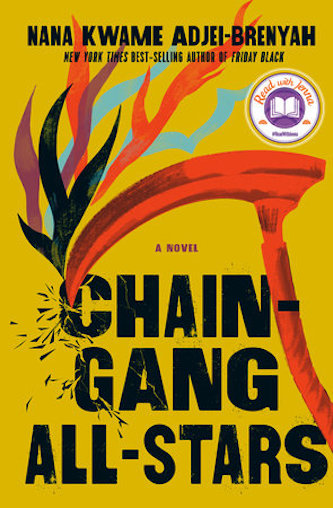Book Review: “Chain-Gang All-Stars” — A Terrifying Future World
By Bill Littlefield
In this novel Nana Kwame Adjei-Brenyah creates a terrifying future world. I’m glad that he chose to anchor that creation so powerfully in the shameful present.
Chain-Gang All-Stars by Nana Kwame Adjei-Brenyah. Pantheon, 363 pages.
 Chain-Gang All-Stars is an ambitious novel by a determined author. Most novelists who want to address hideous social conditions imagine what might happen next and let the damaged characters and grim circumstances do the work. Adjei-Brenyah certainly does this. But via footnotes, he adds messages from history, contemporary and otherwise, to his tale of a world in which the treatment of people convicted of murder is even worse than what incarcerated men and women face in this country. And America leads the world, at least among allegedly democratic nations, in imprisoning its citizens. One such footnote makes that precise numerical point. Another footnote refers to the real life inhumane treatment of three men, Albert Woodfox, Robert King, and Herman Wallace, who all spent decades in isolation before two of them were released and one of them had died.
Chain-Gang All-Stars is an ambitious novel by a determined author. Most novelists who want to address hideous social conditions imagine what might happen next and let the damaged characters and grim circumstances do the work. Adjei-Brenyah certainly does this. But via footnotes, he adds messages from history, contemporary and otherwise, to his tale of a world in which the treatment of people convicted of murder is even worse than what incarcerated men and women face in this country. And America leads the world, at least among allegedly democratic nations, in imprisoning its citizens. One such footnote makes that precise numerical point. Another footnote refers to the real life inhumane treatment of three men, Albert Woodfox, Robert King, and Herman Wallace, who all spent decades in isolation before two of them were released and one of them had died.
The characters in this narrative have been given an alternative to incarceration and constant, unimaginably painful torture. They can elect to fight each other like ancient gladiators, killing each other legally. This blood sport entertains large crowds conditioned to love mayhem, as audiences today have been taught to swallow and wallow in fantasies of Reality TV. The two most significant warriors are women: Hurricane Staxxx and Loretta Thurwar. Each is worshiped by fans who follow every aspect of their idols’ lives, in and out of the arena, via tiny mobile cameras that fly constantly about their favorites. The two women are the primary “links” in a “chain,” or squad, of lesser contestants trying to reach “High Free.” Theoretically, if a warrior is successful enough in the arena, he or she can earn the right to walk away from the hellish world created by the profit-driven mega-corporation that runs the private prison system, among other entities. (“Low-free” is death sustained in the arena, the idea being that one way or another, free is free.)
Though most people are delighted by the spectacle of men and women killing each other in order to gain “blood points,” and perhaps even their release, there is a small group opposing establishment of a mad and murderous circus. But the novel is less about following the efforts of seeking to end not only gladiatorial combat but incarceration itself, than it is about the development of Hurricane Staxxx and Loretta Thurwar. Their relationship is complicated. They depend on each other, they love each other, and, inevitably in a novel built the way Chain-Gang All-Stars is built, they must fight each other.
Adjei-Brenyah’s politics are clear. He has the most significant member of the group opposed to the gruesome, state-sanctioned combat recognize that although “many politicians” had “implored non-violence” among the spectators in advance of the combat, this was “an absurd thing for the murderous state to plead for, but, as always, the massive violence of the state was ‘justice,’ was ‘law and order,’ and resistance to perpetual violence was an act of terror.” But, because the author creates a world at least as repressive and violent as that of, for example, The Handmaid’s Tale, he’s had to be inventive and explicit in his descriptions of the grim things the authorities can do to incarcerated people and the almost equally violent punishments the combatants in the arena can inflict on each other with a variety of weapons. The latter will leave video game fans who read the novel drooling. But that raises the thorny issue of exploitation. Adjei-Brenyah’s hope is that not too many readers of Chain-Gang All-Stars will think the combat the novel creates is cool. Who can be sure?
One function of dystopian novels is to alert readers to the awful potential of the systems we often take for granted. The implication is that, if all goes along as it has been going along, the future will be much worse than the present. Adjei-Brenyah felt that the best way to accomplish that is to educate his readers, via the aforementioned footnotes, about the cruelty and injustice that infests the carceral state in this country today, where men and women in prison are often so effectively isolated that people on the outside hear very little about what incarcerated people endure on a daily basis, for years. As of 2018, while 392 out of every 100,000 white men are incarcerated, 2,272 out of every 100,000 Black men claim that hideous distinction. He also points out that, under the US Constitution, enslaving the incarcerated is legal.
Nana-Kwame Adjei-Brenyah is an energetic storyteller with a vivid, sometimes grotesquely grim imagination. He creates a terrifying future world. I’m glad that he chose to anchor that creation so powerfully in the shameful present.
Bill Littlefield has been working for several years with the Emerson Prison Initiative. His most recent novel is Mercy (Black Rose Writing, 2022)
